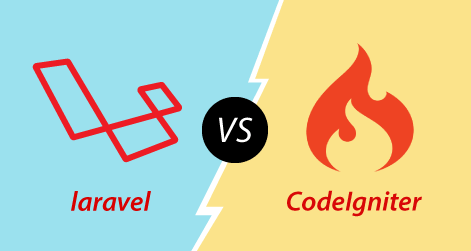Laravel vs CodeIgniter
What is Laravel?
Laravel is a free and open-source php web framework developed by Taylor Otwell to build the web application based on the model-view controller (MVC). The main aim of developing the Laravel is to provide an alternative to the CodeIgniter framework, which does not provide built-in support for authentication and authorization.
What is CodeIgniter?
CodeIgniter is an open-source php web framework used for developing web applications rapidly. CodeIgniter is useful for the short-term project, but not for the long-term projects.
Nowadays, the Laravel framework is more popular than CodeIgniter because of its performance, functionality, and usability. The developers compare the performance, functionality, and usability of different php frameworks according to the needs of their project.
Let's understand the differences between Laravel and CodeIgniter.

- Support for php 7
PHP 7 is a server-side programming language that contains certain new features and enhancements, and these features enhance the performance of the web application and reduce memory consumption. Both the frameworks, i.e., Laravel and CodeIgniter, support the 7 versions of php, but the developers face the problem while developing and testing the applications of php 7 in the CodeIgniter framework.
- Built-in modules
Mostly, developers prefer to divide the complex features into smaller modules to speed up the development process. Laravel contains the in-built modularity feature, which divides the project into smaller modules through a bundle, and these modules can be reused across multiple projects. CodeIgniter framework is not designed with the in-built modularity feature, so CodeIgniter developers need to create the modules with the help of a modular extension.
- Support for the databases
Both the frameworks, i.e., Laravel and CodeIgniter, support the array of databases such as MySQL, PostgreSQL, Microsoft BI, and MongoDB. But, CodeIgniter supports some additional databases such as Oracle, Microsoft SQL Server, IBM DB2, orientdb, and JDBC. Therefore, we can say that CodeIgniter supports a higher number of databases than Laravel.
- Eloquent ORM
Laravel contains the feature of eloquent ORM. The Eloquent ORM (Object Relational Mapper) is used to interact with the different databases more effectively. The CodeIgniter does not support the eloquent ORM. Laravel uses Eloquent ORM that allows the users to interact with a database through a single model. This single model allows the user to perform various tasks on a single table, such as inserting new records, deleting a record, or updating a record.
- Blade Template Engine
Laravel has an in-built blade template engine that allows the developers to enhance the performance of the application by manipulating views. But, CodeIgniter does not have an in-built template engine. Laravel framework is integrated with a blade template engine to perform the common tasks and boost the performance of the web application.
- Rest API Development
Laravel contains the Rest API Controllers that helps the Laravel developers to build the Rest APIs. In Laravel, we need to simply set the $restful property to true in the Rest API controller to build the custom Rest APIs without writing the additional code. But, CodeIgniter does not have specific features that simplify the development of the custom Rest API. The developers need to write the additional code to develop the custom Rest API.
- Routing
The routing options available in both the frameworks work similarly. But the routing feature provided by the Laravel defines the routes in a more efficient way. In Laravel, all the routes can be defined in a single file. The route takes a single URI and a closure.
- HTTPs Support
Mostly, web developers use the http protocol to send and receive sensitive information securely. Laravel allows the developers to create custom http routes. Laravel keeps the data transmission secure by adding https://protocol before the URL automatically. CodeIgniter does not provide http support. In the case of CodeIgniter, developers need to use the URL helper to make the data transmission secure.
- Authentication
Laravel provides the authentication class that makes it easy for the developers to implement authentication and authorization in a web application. But the CodeIgniter does not have an in-built authentication feature, so developers need to write the custom CodeIgniter extensions to provide the authentication.
- Unit Testing
Laravel comes with an in-built testing tool, i.e., PHPUnit. The PHPUnit is a widely used unit testing tool. But, CodeIgniter does not come with an in-built testing tool. In CodeIgniter, we need to add the additional testing tool that will be used to assess the quality of the software by performing unit testing.
- Community Support
Both the frameworks, i.e., Laravel and CodeIgniter, are free and open-source php web framework. Both the frameworks have a large community, but the members of a Laravel community are more active than the members of a CodeIgniter framework. The developers can avail instant online help while developing the application in Laravel. So, php developers choose the Laravel framework due to these additional features available in a Laravel.
|

 For Videos Join Our Youtube Channel: Join Now
For Videos Join Our Youtube Channel: Join Now










